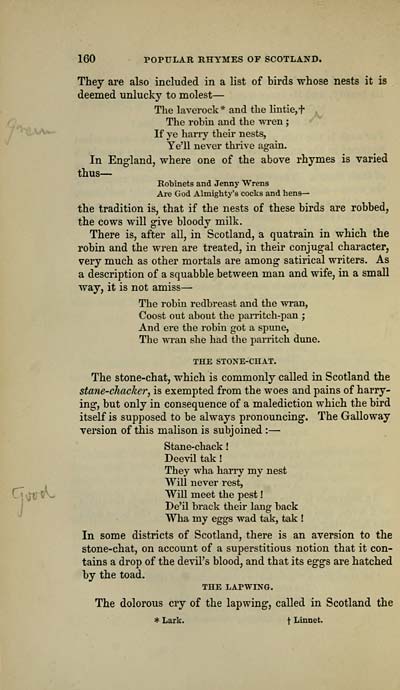Download files
Complete book:
Individual page:
Thumbnail gallery: Grid view | List view

160 POPULAR RHYMES OF SCOTLAND.
They are also included in a list of birds whose nests it is
deemed unlucky to molest —
The laverock* and the lintie,t
The robin and the wren ;
If ye harry their nests,
Ye'll never thi'ive again.
In Eng-land, where one of the above rhymes is varied
thus —
Robinets and Jenny Wrens
Are God Almighty's cocks and hens—
the tradition is, that if the nests of these birds are robbed,
the cows will give bloody milk.
There is, after all, in Scotland, a quatrain in which the
robin and the wren are treated, in their conjugal character,
very much as other mortals are among satirical writers. As
a description of a squabble between man and wife, in a small
way, it is not amiss —
The robin redbreast and the wi-an,
Coost out about the parritch-pan ;
And ere the robin got a spime,
The wran she had the parritch dime.
THE STOXE-CHAT.
The stone-chat, which is commonly called in Scotland the
stane-chacker, is exempted from the woes and pains of harry-
ing, but only in consequence of a malediction which the bird
itself is supposed to be always pronouncing. The Galloway
version of this malison is subjoined : —
Stane-chack !
Deevil tak !
They wha hany my nest
Will never rest,
' t'w Will meet the pest !
De'il brack their lang back
Wha my eggs wad tak, tak !
In some districts of Scotland, there is an aversion to the
stone-chat, on account of a superstitious notion that it con-
tains a drop of the devil's blood, and that its eggs are hatched
by the toad.
THE LAPWING.
The dolorous cry of the lapwing, called in Scotland the
* Lark. t Linnet.
They are also included in a list of birds whose nests it is
deemed unlucky to molest —
The laverock* and the lintie,t
The robin and the wren ;
If ye harry their nests,
Ye'll never thi'ive again.
In Eng-land, where one of the above rhymes is varied
thus —
Robinets and Jenny Wrens
Are God Almighty's cocks and hens—
the tradition is, that if the nests of these birds are robbed,
the cows will give bloody milk.
There is, after all, in Scotland, a quatrain in which the
robin and the wren are treated, in their conjugal character,
very much as other mortals are among satirical writers. As
a description of a squabble between man and wife, in a small
way, it is not amiss —
The robin redbreast and the wi-an,
Coost out about the parritch-pan ;
And ere the robin got a spime,
The wran she had the parritch dime.
THE STOXE-CHAT.
The stone-chat, which is commonly called in Scotland the
stane-chacker, is exempted from the woes and pains of harry-
ing, but only in consequence of a malediction which the bird
itself is supposed to be always pronouncing. The Galloway
version of this malison is subjoined : —
Stane-chack !
Deevil tak !
They wha hany my nest
Will never rest,
' t'w Will meet the pest !
De'il brack their lang back
Wha my eggs wad tak, tak !
In some districts of Scotland, there is an aversion to the
stone-chat, on account of a superstitious notion that it con-
tains a drop of the devil's blood, and that its eggs are hatched
by the toad.
THE LAPWING.
The dolorous cry of the lapwing, called in Scotland the
* Lark. t Linnet.
Set display mode to: Large image | Transcription
Images and transcriptions on this page, including medium image downloads, may be used under the Creative Commons Attribution 4.0 International Licence unless otherwise stated. ![]()
| Early Gaelic Book Collections > J. F. Campbell Collection > Popular rhymes of Scotland > (168) |
|---|
| Permanent URL | https://digital.nls.uk/81376610 |
|---|
| Description | Volumes from a collection of 610 books rich in Highland folklore, Ossianic literature and other Celtic subjects. Many of the books annotated by John Francis Campbell of Islay, who assembled the collection. |
|---|
| Description | Selected items from five 'Special and Named Printed Collections'. Includes books in Gaelic and other Celtic languages, works about the Gaels, their languages, literature, culture and history. |
|---|

